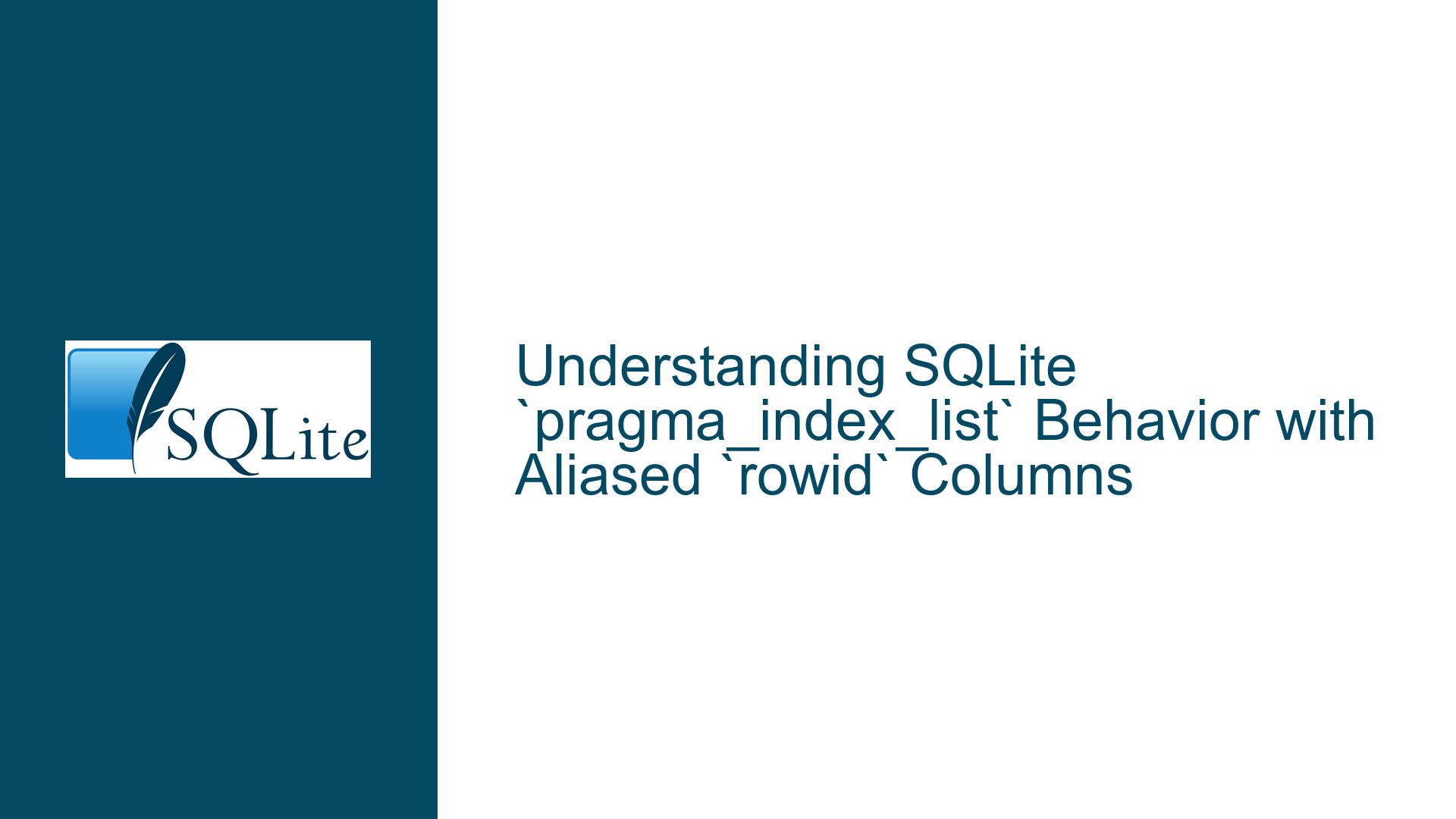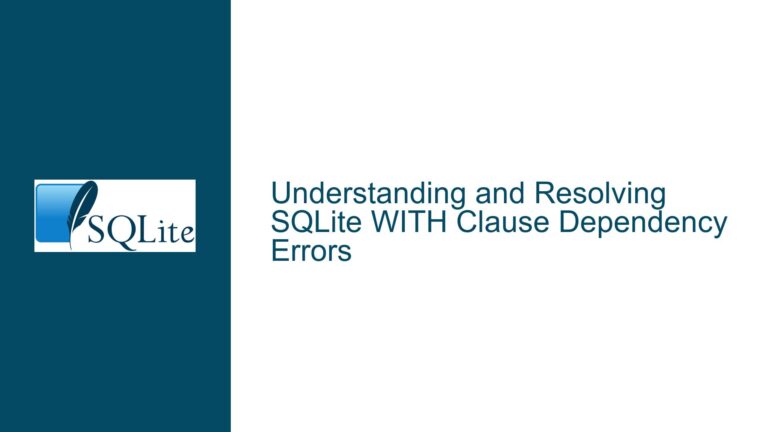SQLite `pragma_index_list` Behavior with Aliased `rowid` Columns
Issue Overview: pragma_index_list Does Not Report Primary Key Columns Aliasing rowid
When working with SQLite, one of the most common tasks is to inspect the structure of a table, including its indexes. The pragma_index_list pragma is a useful tool for this purpose, as it returns a list of indexes associated with a given table. However, there is a subtle but important behavior of pragma_index_list that can lead to confusion: it does not report primary key columns that alias the rowid of the table.
Consider the following two table creation statements:
CREATE TABLE foo (id PRIMARY KEY);
and
CREATE TABLE foo (id INTEGER PRIMARY KEY);
At first glance, these statements appear to create similar tables, both with a primary key column named id. However, the behavior of pragma_index_list differs significantly between the two. In the first case, where the primary key is not explicitly declared as an INTEGER, pragma_index_list returns an index named sqlite_autoindex_foo_1, indicating that an index has been created for the primary key. In the second case, where the primary key is explicitly declared as an INTEGER, pragma_index_list returns no results. This discrepancy arises because, in the second case, the id column is not just a primary key but also an alias for the rowid of the table.
The rowid in SQLite is a special column that is automatically created for every table unless the table is defined as a WITHOUT ROWID table. When a column is declared as an INTEGER PRIMARY KEY, it becomes an alias for the rowid. This means that the column does not require a separate index, as the rowid itself is used to uniquely identify the row. Consequently, pragma_index_list does not report an index for such columns, leading to the observed behavior.
This behavior is not explicitly documented in the SQLite documentation for pragma_index_list, which can lead to confusion for developers who rely on this pragma to inspect table indexes. Understanding this nuance is crucial for correctly interpreting the results of pragma_index_list and for designing tables that behave as expected.
Possible Causes: Why pragma_index_list Fails to Report Aliased rowid Columns
The root cause of this behavior lies in the way SQLite handles primary keys and the rowid column. When a column is declared as an INTEGER PRIMARY KEY, SQLite treats it as an alias for the rowid. This has several implications:
No Separate Index Needed: The
rowidis inherently indexed by SQLite, as it is used to uniquely identify each row in the table. Therefore, when a column is an alias for therowid, SQLite does not create a separate index for that column. This is whypragma_index_listdoes not return any results for such columns.Internal Representation: SQLite internally represents the
rowidand its aliases differently from regular primary key columns. Regular primary key columns (those not aliasingrowid) are treated as separate entities and require an index to enforce uniqueness. This is whypragma_index_listreturns an index for such columns.Documentation Gap: The SQLite documentation for
pragma_index_listdoes not explicitly mention this behavior, leading to potential confusion. Developers may expectpragma_index_listto return an index for all primary key columns, regardless of whether they alias therowid.Historical Context: The behavior of
rowidand its aliases has evolved over time in SQLite. Early versions of SQLite did not supportWITHOUT ROWIDtables, and therowidwas always present. As SQLite evolved, the distinction betweenrowidaliases and regular primary keys became more pronounced, but the documentation forpragma_index_listdid not fully reflect these changes.
Understanding these causes is essential for diagnosing issues related to pragma_index_list and for designing tables that behave as expected. It also highlights the importance of being aware of the nuances of SQLite’s internal mechanisms when working with the database.
Troubleshooting Steps, Solutions & Fixes: Handling pragma_index_list Behavior with Aliased rowid Columns
To effectively troubleshoot and address the issue of pragma_index_list not reporting primary key columns that alias the rowid, follow these steps:
Verify Table Structure: Before relying on
pragma_index_list, use thepragma_table_infoorpragma_table_xinfopragmas to inspect the table structure. These pragmas provide detailed information about the columns in a table, including whether a column is anINTEGER PRIMARY KEYand thus an alias for therowid.PRAGMA table_xinfo(foo);This will return a result set that includes a
rowidcolumn, indicating whether the primary key column is an alias for therowid.Understand the Implications of
rowidAliasing: When a column is an alias for therowid, it means that the column does not require a separate index. Therowiditself is inherently indexed, and thus,pragma_index_listwill not return an index for such columns. This is expected behavior, even if it is not explicitly documented.Use
pragma_index_listin Conjunction with Other Pragmas: To get a complete picture of the indexes associated with a table, usepragma_index_listin conjunction withpragma_table_infoorpragma_table_xinfo. This will allow you to determine whether the absence of an index inpragma_index_listis due to the column being an alias for therowid.Consider Using
WITHOUT ROWIDTables: If the behavior ofrowidaliasing is causing issues, consider usingWITHOUT ROWIDtables. In such tables, therowidis not present, and all primary key columns are treated as regular columns, requiring explicit indexes. This can simplify the behavior ofpragma_index_listand make it more predictable.CREATE TABLE foo (id INTEGER PRIMARY KEY) WITHOUT ROWID;In this case,
pragma_index_listwill return an index for theidcolumn, as it is no longer an alias for therowid.Update Documentation and Knowledge Base: If you are working in a team or maintaining a codebase, ensure that the behavior of
pragma_index_listwith aliasedrowidcolumns is well-documented. This will help prevent confusion and ensure that all team members are aware of this nuance.Leverage SQLite’s Internal Dictionary: SQLite maintains an internal data dictionary that contains detailed information about tables and their columns. While this information is not directly exposed through standard pragmas, it can be accessed through custom SQL queries or extensions. Understanding the internal representation of
rowidaliases can provide additional insights into their behavior.Test and Validate: When designing or modifying tables, thoroughly test the behavior of
pragma_index_listand other related pragmas. Validate that the results align with your expectations and that the table structure meets the requirements of your application.
By following these steps, you can effectively troubleshoot and address the issue of pragma_index_list not reporting primary key columns that alias the rowid. This will ensure that your database schema is well-designed and that you can accurately inspect and manage table indexes in SQLite.
Conclusion
The behavior of pragma_index_list with respect to primary key columns that alias the rowid is a nuanced aspect of SQLite that can lead to confusion if not properly understood. By recognizing that such columns do not require a separate index and by using complementary pragmas like pragma_table_info and pragma_table_xinfo, you can gain a comprehensive understanding of your table’s structure and indexes. Additionally, considering the use of WITHOUT ROWID tables and maintaining thorough documentation can help mitigate potential issues and ensure that your database schema is robust and well-maintained.






